Cowper’s Cut 348: Truth or Consequences

I know I’ve written this line before, but it remains true that you can always tell when things are getting really bad in the NHS: people start telling the truth.
Truth or Consequences: not just a city in New Mexico.
I’ve written about the proud tradition of NHS financial lying, both here and elsewhere, for many years now.
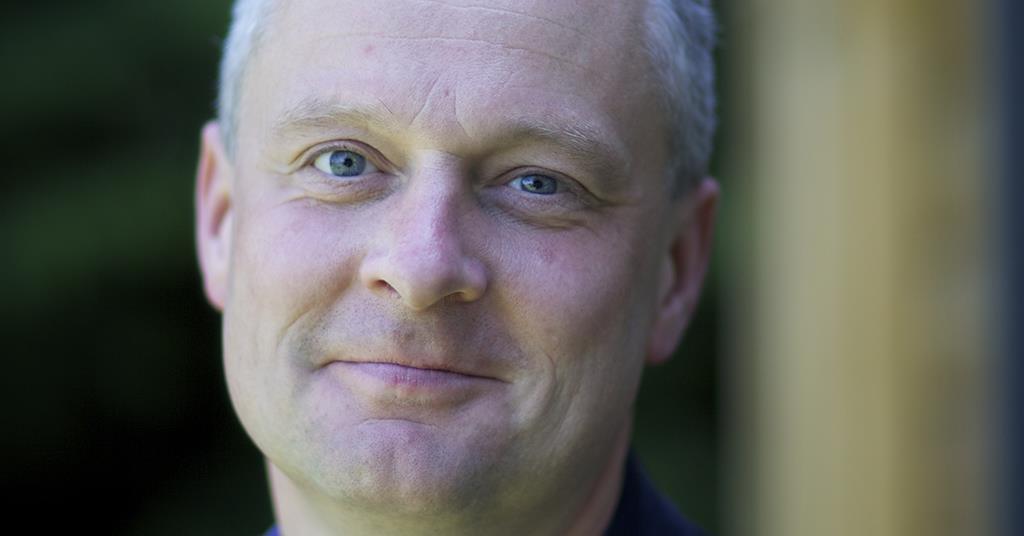
Thankfully, my efforts have been the catalyst to prevent people from lying about NHS finances ever again … oh.

This week saw a genuinely consequential interview in Health Service Journal with respected finance director Hardev Virdee.
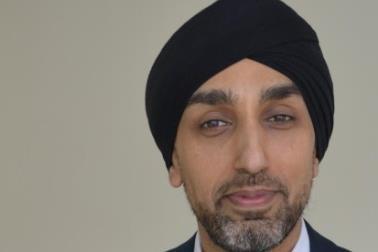
Mr Virdee is the group finance officer of Barts Health Trust; junior vice-president of the Chartered Institute of Public Finance and Accountancy, and the chair of the NHS National Finance Academy. He knows whereof he talks.
Incredible NHS financial plans
Mr Virdee told HSJ editor Alastair McLellan that the English NHS financial planning process was undermining the credibility of both the financial plans it produced and the senior NHS finance staff involved. Mr Virdee assessed this “erosion of credibility” had grown over the last five years.
That is quite something for a senior finance leader to say on the record, out loud in The Real World, but it didn’t stop there.
Mr Virdee suggested that NHS England's main aim was to produce financial plans that were acceptable to government, rather than being sustainable or credible; a process which means that finance directors and boards are increasingly having to “consider unethical options”.
He also claimed that the pressure felt by many senior NHS finance professionals is seriously affecting their morale, making some leave the sector, and discouraging others from taking on the most senior and toughest jobs.
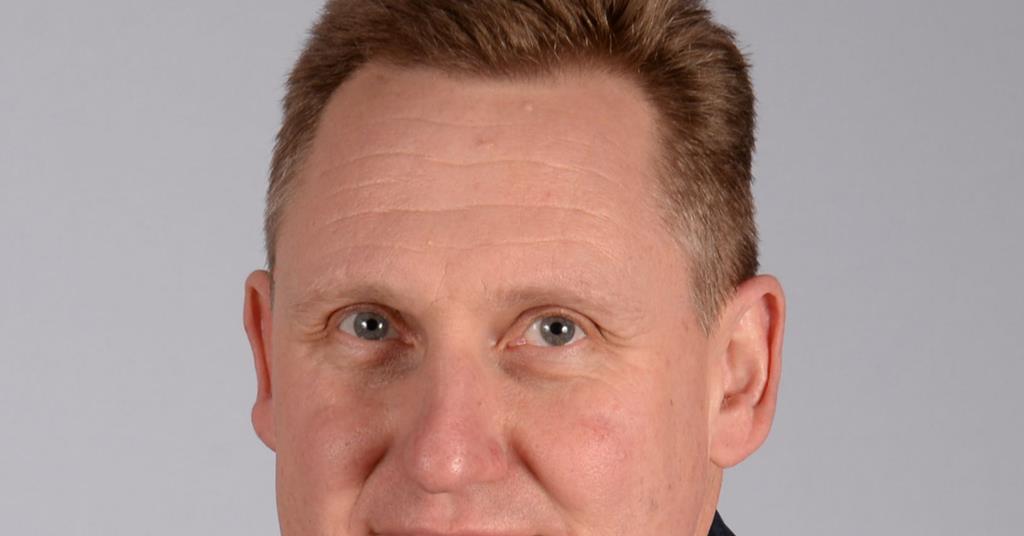
This interview comes in the wake of HSJ’s recent roundtable with chief executives, which agreed that there is little benefit in resisting the imposition of unrealistic financial plans demanded by NHS England.
No point in honest finance conversations with NHS England
Somerset Foundation Trust chief executive Peter Lewis told that meeting that it was “totally clear” the NHS was not handling financial planning discussions in the right way, claiming there was “no point” in having “honest conversations” with NHS England when putting together annual financial plans.
He said that his trust and the local system had made a conscious decision to focus on “closing the gap” by simply adjusting the financial plan – and not to address the funding and demand pressures that were the underlying cause of much of its financial and performance problems with NHSE.
Mr Lewis said, “there’s an answer that’s required [by NHSE], and if [they] don’t get that answer, you just get told to go back and try again. You can’t really have a conversation about what are the [underlying] issues and what are the solutions you need to put in place to address those issues.”
In place of fear
I do not need to tell ‘Cut’ readers that it is Really Not Usual for senior figures to be speaking out in this way.
This tells us one big thing that we already know, which is that the 2024-25 financial year is heading for a very big miss. It will be a miss of such magnitude that not even the hidden reserves down the back of all the Richard Douglas sofas in all of Wellington House will come close to touching the sides.
It tells us an even bigger thing, which ‘Cut’ has been chronicling for the past few years: that NHS England has lost all its credibility as the national system leader.
There is no particular benefit in personalising this: current chief executive Amanda Pritchard, The Woman In Black, is undoubtedly not a bad, incompetent or malicious individual. Doubtless, she tries hard and means well. (What a career epitaph.)
But she is an ineffective leader, with terrible taste in recruitment. She is also overseeing and permitting a level of NHS financial fantasy which is frankly reminiscent of a Ponzi scheme.
Senior NHS managers are not an intrinsically rebellious constituency of people. It is the certain fate of every national NHS leader not to be loved by every one of their senior managers, but even for those national leaders prone to episodic abrasiveness, there has generally been a broad sense of respect.
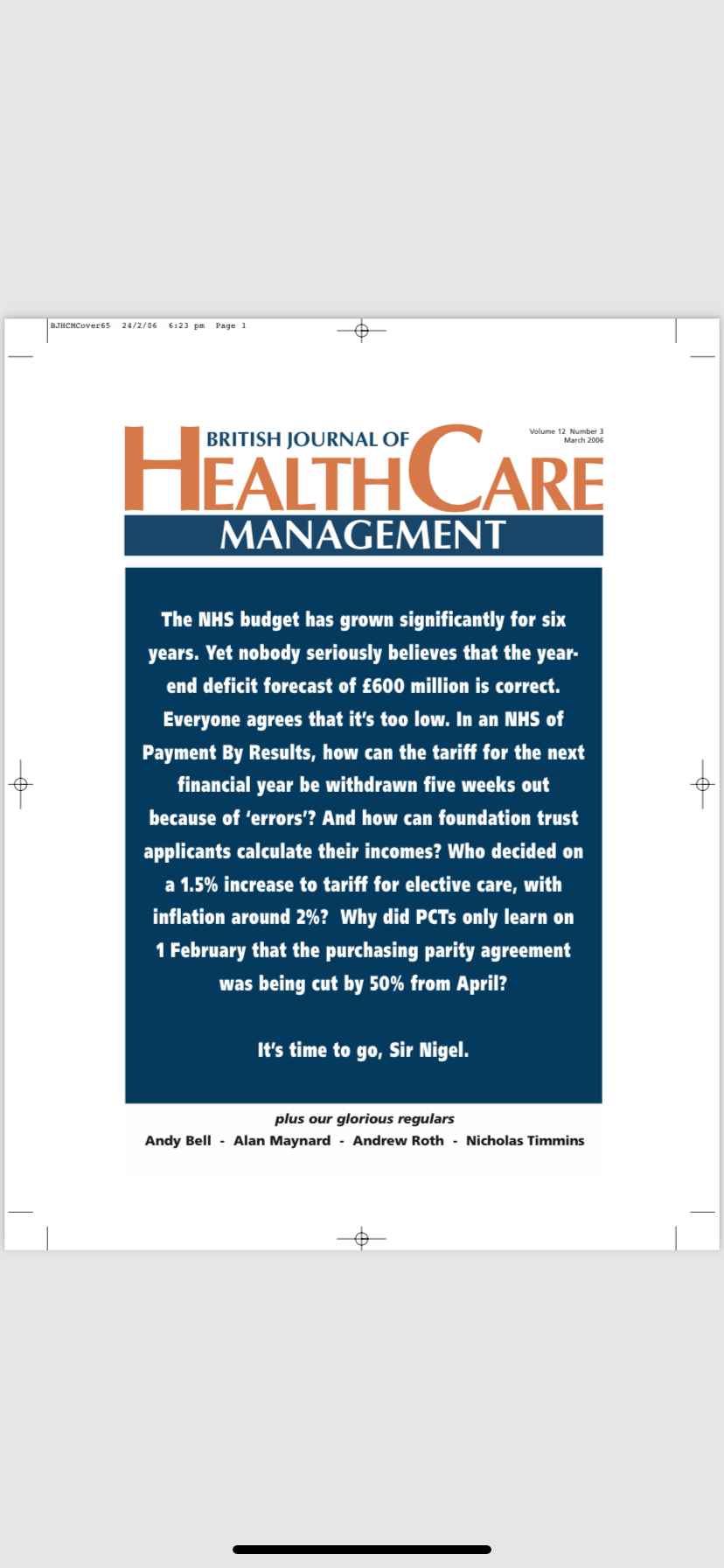
The counter-example of this was in the final months of the era of Baron Crisp of Eaglescliffe, when widely-prevailing knowledge of his ‘if-I-get-Gus-O’Donnell’s-job-I’ll-recommend-you‘ succession conversations over lunches with several SHA bosses at the Garrick combined with the £1 billion financial overspend in 2005-6 (and such associated ineffectual flapping as the Selbie Letter) to render his departure inevitable.
Gosh. Remember back when a £1 billion overspend seemed like a very big deal?
Put simply, this degree of outspokenness over NHS financial lying is the clearest possible vote of no confidence from the service in NHS England’s leadership.
That is something truly unprecedented.
Permanent Milburn
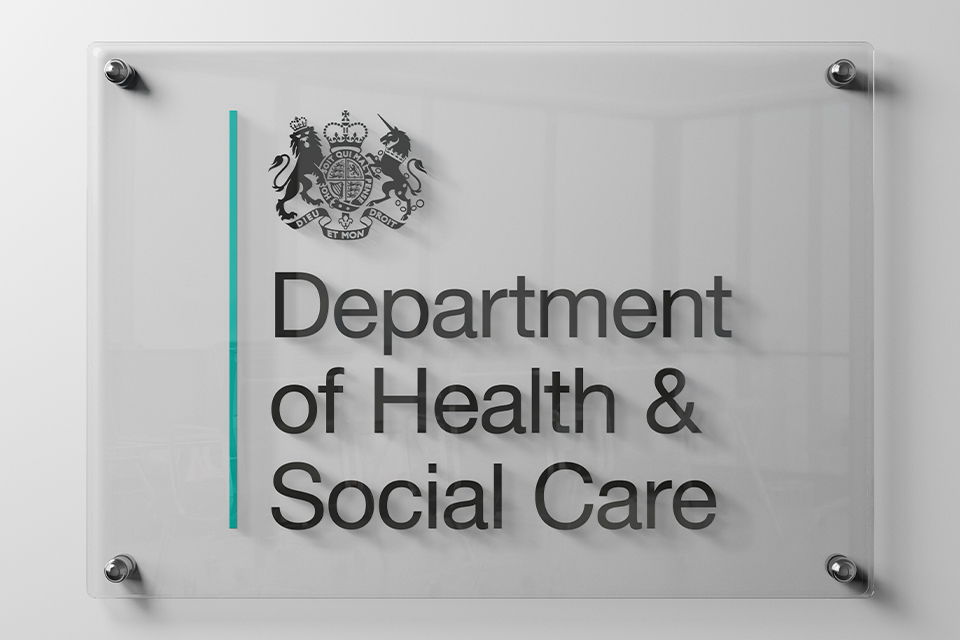
No, ’Permanent Milburn’ is not the title of Secretary Of State For Health But Social Care Secretary Wes Streeting’s next volume of autobiography.
Delighted to welcome Alan Milburn back to @DHSCgovuk as Lead Non-Exec Board Member.
— Wes Streeting (@wesstreeting) November 9, 2024
As Health Secretary, Alan’s reforms delivered the shortest waiting times and highest patient satisfaction in the history of the NHS.
His unique expertise and experience will be invaluable. https://t.co/e04EnvUMq3
Or at least, not yet.

Pitch-rolling for SOS Streeting’s speech to a probably half-empty NHS Providers conference this week doesn’t come much more blatant than Alan Milburn’s interview with The Times’ Chris Smyth, in which Milburn’s appointment as DHBSC lead non-executive director (as first rumoured by The Guardian) was confirmed.
The official announcement makes clear that this appointment process was non-standard: “due to the requirements of the role and the unique expertise and experience Alan Milburn brings, he was appointed directly by the Secretary of State on following consultation with the Commissioner for Public Appointments, and in compliance with the Governance Code on Public Appointments.
“The Department of Health and Social Care would like to thank Samantha Jones for all her work and support as non-executive director since February 2023.”
The announcement also specifies that “Government non-executives provide advice and bring an external perspective to the business of government departments by sitting on departmental boards. They do not have decision-making powers.”
Mmmmmmmmm.
Back to the Last Chance Saloon with Billy Idol
In the Times interview, Milburn characterises the financial attitude of civil servants and NHS leaders as that expressed in Billy Idol’s 1980s hit ‘Rebel Yell’: “more, more, more!”
Mr Milburn also tells a grateful health policy nation that the NHS is “drinking in the Last Chance Saloon”. The article makes the ahistorical assertion that “between 1999 and 2003 … waiting lists began to fall dramatically”. The reality of the dramatic fall took rather longer. Read the Kings Fund or Institute for Fiscal Studies analysis.
So far, so nostalgic.

For a more interesting take on reform, I trawled the archives for this speech that Mr Milburn made to the NHS Confederation’s 2001 conference. It is much more nuanced and reasonable than this interview, or than his 2014 lecture to NHS Providers.
These few paragraphs from Mr Milburn’s 2001 speech stand out: “it is the ethos of public service that can light the way to a fairer, more decent society in Britain today. But just as surely as it is that ethos of public service that makes the NHS, losing that ethos would break the NHS.
“We risk the ethos of the NHS, its values and its principles, at our peril. That is why we say while we will forge a new relationship with the private sector, it is just that: a relationship, not a takeover. NHS values are not the same as private sector values. Health care relies on trust between patients and professionals. The fundamental reason the NHS is still trusted by patients today is because they know that decisions about their treatment are based on the scale of their needs not the size of their wallets. You only have to look across the Atlantic to see what happens when frontline health care is compromised by a clash of motives. Trust is lost. Competition replaces co-operation. Two-tier care develops. In America, 40 million people have no health care cover whatsoever. A free market in health care does not work.
“It is not the right way forward for health care in Britain. NHS values are British values – compassion, fairness, a belief in the strength of community, co-operation with others as the basis for individual progress. It would be folly to sacrifice these values and these principles. So while some subscribe to the philosophy that all things private are good, all things public are bad I say: that philosophy belongs not today but to yesterday.
“There is no saviour of the NHS other than the NHS itself. But we do need every bit of help we can get to renew the NHS. That’s why we will not close our minds to the NHS and the private sector co-operating where private sector expertise or finance can bring benefit to NHS patients. The point is to define the nature of the relationship – what it is and what it is not. It is not about creating a mixed economy of care. It is about maximising the care that is available to NHS patients, based on NHS principles.
“Some have said our proposals are too opaque. I say we have taken a hard look at where the private sector can help. First, using spare capacity in the private sector, such as in private hospitals, to perform operations on NHS patients. Second, getting private sector management to run some of the new stand-alone surgery centres our Manifesto commits us to building and which will specialise in precisely those procedures where private hospitals have some expertise. Third, extending PFI beyond the hospital sector where it has already helped deliver the biggest hospital building programme the NHS has ever seen into new PPPs in primary care, social services and the provision of equipment. And fourth using private sector management expertise such as in the provision of IT systems.”
That’s Alan Milburn via Simon Stevens, circa 2001: back when speeches could be written in proper paragraphs (by people who could think in proper paragraphs).
If Mr Streeting’s reliance is on the advice of the 2001 era of Mr Milburn, then I think we can feel somewhat reassured.
Think Groucho, not Karl
But Mr Milburn’s 2014 ‘Seizing The Opportunity’ comments, and those in this Times interview, should give us all - Mr Streeting included - pause for reflection.
They appear to be forged in a zeitgeist of Marxist dialectic, seeking enemies and opponents: meaningful NHS reform will get much further much faster by building a consensus for change.
And remember that Mr Milburn’s early career included running the radical bookshop ‘Days Of Hope’ (which was better known locally as ‘Haze Of Dope’).
Nonsense BBC reporting
Nick Triggle of BBC News is an interesting journalist, but not in a good way. When I read his pieces, I almost always get a strange sense that he’d much rather be writing for a partisan newspaper.

This odd FOI-based piece, using a sample of 41 trusts, takes its framing from an un-named figure in NHS England (who may or may not be called Chis Hopson), telling Mr Triggle that the FOI findings of overtime payments to doctors were A Bad Thing: “it is totally unacceptable for hospitals to be forced to pay rip-off rates – over which they have limited control."
A senior NHS source (who may occupy the same pair of shoes as the first source) is quoted thus: “Consultants hold all the cards – they know we cannot make progress on the backlog without them … (being) in a pretty unique position compared to other staff", because their contracts meant they could opt out of non-emergency weekend work and then charge whatever their hospital was willing to pay for overtime: "what worries me is that the overtime costs are going to keep increasing with the need to tackle the backlog, and this will breed resentment among other NHS staff who often work overtime for little more”.
The piece cites suggested solutions from NHSE’s Possibly Chris Hopson: “the NHS needed to hire more consultants, ask other staff to take on some of their work and invest in technologies such as artificial intelligence to lighten the load”.
Ah good: another example of the AI Kool-Aid being drunk deep (possibly at the Last Chance Saloon).
One must have a heart of stone not to laugh.
These comments imply a fiesta of remarkably bad ideas. Let’s interrogate a few.
The NHS needs to hire more consultants: from where, exactly?
The implied concept that trusts want to negotiate pay locally with their staff is just deeply funny, to those of us who remember how many NHS trusts used their foundation trust freedom to vary from Agenda For Change (only Southend, and even them not for very long or by very much).

Indeed, this week’s industrial dispute between University Hospitals Birmingham and its staff about overtime rates reported in HSJ rather makes the opposite case.
This FOI-based story is out of the same playbook that parts of the populist tabloid media used after the impacts of the new 2000s GP contract came through: citing a small number of in that case (usually single-handed prescribing practice) GPs with abnormally high earnings from working all the hours there are, often in remote communities, with the aim of pretending that this presents an accurate picture of an NHS gravy train.
It is curious to see pseudo-pro-market populists so unable to understand how supply and demand work. When a workforce set-up that has restricted the supply of training, of training posts and so of consultants decides that it wants more activity from the consultants available, there are a limited number of demonstrably effective incentives to get them to work in their evenings and weekends. You can try exhortion, prayers and shaming, if you like. Go wild: you could even try applause.
Or you can try paying them. To quote from the film ‘Bad Santa’, “wish in one hand, shit in the other one and see which fills up first”.
The Argar Saga
I empathise with readers’ feelings of grief and loss at the departure of Bob The Whippet’s emotional support human Victoria Atkins as shadow health secretary.
As Julian Patterson rightly noted, Vic and Bob were quite the double-act.
Mrs Atkins’ tenure as SOS (and then shadow) was so devoid was of achievements that it really isn’t possible to review her time in the job. She may even have been less consequential than Dr Therese ‘Tiz’ Coffey, who at least gave us all a good laugh with the antibiotics and the positivity and Oxford commas, and that.
But time and new Conservative And Unionist Party ex-leader-in-waiting Kemi Badenoch wait for no emotional support human: Mrs Atkins has been replaced by former health minister 2019-22, Edward Argar. This is a man who was previously a director of public affairs for outsourcing firm Serco, but let us give him a chance anyway.
The amount that Mr Argar learnt from his then-boss, Matt ‘Alan’ Hancock, remains to be seen.
Those who dealt directly with Mr Argar in those three years note that he was less swivel-eyed than his boss (which is not a high bar), and could be personally agreeable. He was also prone to engage with NHS leaders: a task which The People’s Partridge clearly felt was beneath his considerable dignity.
Congratulations to Ed Argar on his appointment to the best job in opposition. He is one of the few keepers of the One Nation Tory flame, now dimmed by the surge of the right wing populism that has swept his party. Wish him every success in restoring reason to Conservatism.
— Wes Streeting (@wesstreeting) November 5, 2024
Wes Streeting welcomed Mr Argar as a One Nation Conservative.
Let’s see, shall we?
Recommended and required reading
Thoughtful Financial Times piece on what the shift to prevention means and may look like.
Medical isotope shortages mean that more cancer cases may be diagnosed late and treatment delayed unless Britain develops its own nuclear medicine manufacturing capability, The Times reports. Since October, hospitals have been restricting the use of medical isotopes amid production difficulties in the few global facilities that can make them.
Another welcome pushback on the Tony Blair Institute et al’s tidal wave of AI Hypebeasting, from Hetan Shah in the New Statesman.
Longevity specialist Dr Stuart Jay Olshansky tells the Boris Johnson Fanzine why he’s bet against the human condition, and the consequences of interfering with ageing.








